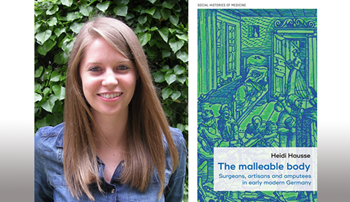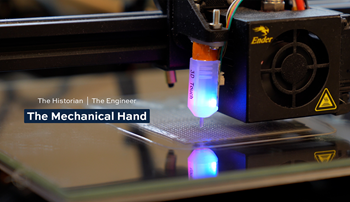Office Hours
By appointment only
In the news
Education
PhD, Princeton University
MA, Princeton University
BA, University of Notre Dame
About Me
Heidi Hausse joined the faculty at Auburn in fall 2018. Hausse is a historian of early modern Europe (c.1500-1700), with a particular interest in the intersections of culture, medicine, and technology. Her book, The Malleable Body: Surgeons, Artisans and Amputees in Early Modern Germany, examines surgical treatises and artifacts of prostheses to uncover a transformation in the ways in which surgeons and artisans cut apart the human body through amputation and worked to artificially put it back together with mechanical limbs.
Hausse received her PhD in history from Princeton University in 2016, and was a member of the Society of Fellows in the Humanities at Columbia University from 2016-2018. She was also the 2016-2017 Molina Fellow in the History of Medicine & Allied Sciences at the Huntington Library. Her research has been supported by the American Council of Learned Societies, the Consortium for History of Science, Technology and Medicine, and the Dr. Günther Findel-Stiftung Foundation.
At Auburn, Hausse teaches on everyday life, medicine and the body, and witchcraft in early modern Europe, as well as survey courses in world history and European history from the Renaissance to the French Revolution.
Listen to podcast: Mechanical Hands
Research Interests
early modern Europe, cultural history, history of the body, history of medicine, history of technology, disability studies
Publications
- The Malleable Body: Surgeons, Artisans and Amputees in Early Modern Germany. Manchester: Manchester University Press, 2023.
- “The Locksmith, the Surgeon, and the Mechanical Hand: Communicating Technical Knowledge in Early Modern Europe,” Technology and Culture 60:1 (2019): 34-64.
- “Bones of Contention: The Decision to Amputate in Early Modern Germany,” The Sixteenth Century Journal 47:2 (2016): 327-350.
- “European Theories and Local Therapies: Mordexi and Galenism in the East Indies, 1500-1700,” Journal of Early Modern History 18 (2014): 121-140.
Courses Taught
- HIST 1010: World History I
- HIST 2070: European History from the Renaissance to 1789
- HIST 3610: Private Lives and Public Places in Early Modern Europe
- HIST 4970 (Senior Seminar): Magic & Witchcraft in Early Modern Europe
- HIST 5300/6300: Early Modern Europe – Approaches to the Field
- HIST 7420: Popular Culture in Early Modern Europe







